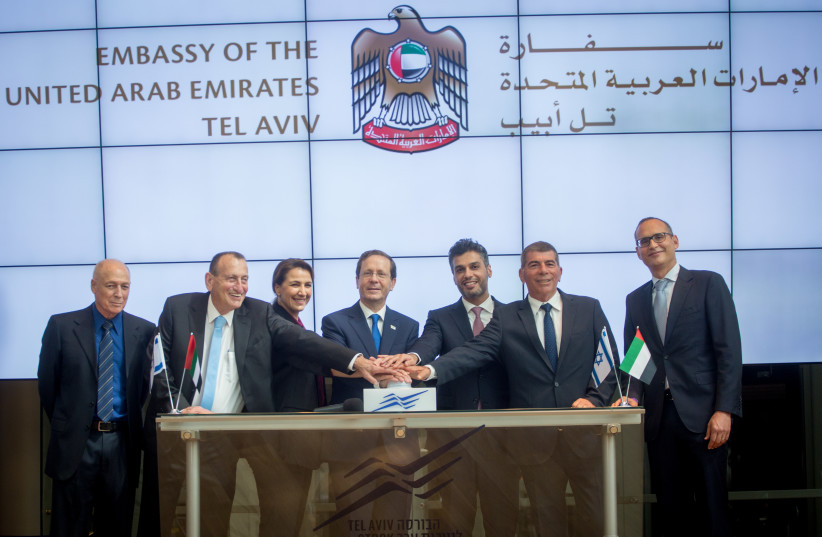A unique seminar this week brings together Israelis, Moroccans, and Bahrainis to the UAE where they will join Emirati students. The seminar is part of the Friedberg Economics Institute Fellows program called Economics, Growth, and Prosperity which is building on the Abraham Accords. The event takes place through September 7 in Abu Dhabi. It is the second time this unique event has taken place, and it occurs on the eve of the third anniversary of the Accords.
This event presents an important opportunity to examine the economic connections that link Israel, the Gulf, Morocco, and other countries. Omar Ghobash, UAE ambassador to the Vatican, is scheduled to speak on Sunday, while other experts and dignitaries will also attend and speak over the coming days.
Last week Bob Borens, the director of the Friedberg Economics Institute (FEI) spoke to The Jerusalem Post about the program. He notes how the institute was founded in 2013 “to provide a platform for educating Israelis about the nature and benefits of economic freedom,” adding that “This is important because the data show that countries that follow these principles have the best economic results – highest growth, highest income, etc.”
The Fraser Index of Economic Freedom of the World measures five components related to how countries can demonstrate whether they improved, or not, in the realm of economic freedom. According to Borens, “Israel has improved dramatically over the years and I believe this is a major reason for the dramatic improvement in economic results. Israel ranked 95 in the world in 1980 and now ranks 49.”
FEI has been conducting seminars on economic freedom for the last decade and these have focused on Israeli university students. “After the Abraham Accords were signed, we decided to add another seminar bringing university students from the Accords countries together to learn about economic freedom,” notes Borens. The first took place in 2022 and included students from the UAE, Morocco, and Bahrain, who came to Israel for the seminar.

The first seminar was a great success, Borens says. “We conveyed our message successfully and there also turned out to be a great cultural dividend. The Arab and Israeli students bonded and formed friendships. Also, all the Arab students told me how different they found Israel to be from their previous understandings and expectations. They were all very pleasantly surprised and all said they look forward to coming back.”
Economic freedom in Abraham Accords countries
Borens is passionate about the importance of economic freedom in the Abraham Accords countries. “These are principles that are equally relevant in all countries – regardless of political systems, religion, or culture.” He says he wants the program to highlight how economic freedom can serve as a common denominator and interest among all the Accords countries. That means in the future holding the seminar in a different Abraham Accords country every year.
The seminar this week brings together experts from a number of institutions such as Stanford’s Hoover Institute, Dartmouth, the National University of Singapore, and George Mason University. “We also have a great lineup of local speakers including Omar Ghobash, adviser to the UAE minister of foreign affairs, and also UAE ambassador to the Vatican, Israeli ambassador to the UAE Amir Hayek, Dr. Sabah al Binali, executive chairman OurCrowd Arabia, and innovation expert Dr Yifat Turbiner,” notes Borens.
The world is changing and seminars like this are taking place at a key time. For example, Borens says that “the world today is not in good shape and I believe teaching this material about economic freedom to the future leaders in the Abraham Accords countries is powerful. The two centers of economic power in the world – the US in the West and China in the East – are sputtering very much because of departure from these principles of economic freedom.”
The changing world is going through real transitions in terms of large trends. China’s growth is slowing, and so is the US’s. The US is also “drowning in debt,” Borens says.
“China had a great economic renaissance after Deng Xiaoping started moving the country away from boilerplate communism and introducing steps of economic freedom. But now Xi Jinping seems to want to go in the opposite direction and the results are not good, as would be expected.”
The seminar in Abu Dhabi can shine a light on economic freedom, he says. “Eternal principles of law that protect property and life, and maintenance of legal system to adjudicate disputes fits well as a common denominator among nations who are the offspring of Abraham.”
